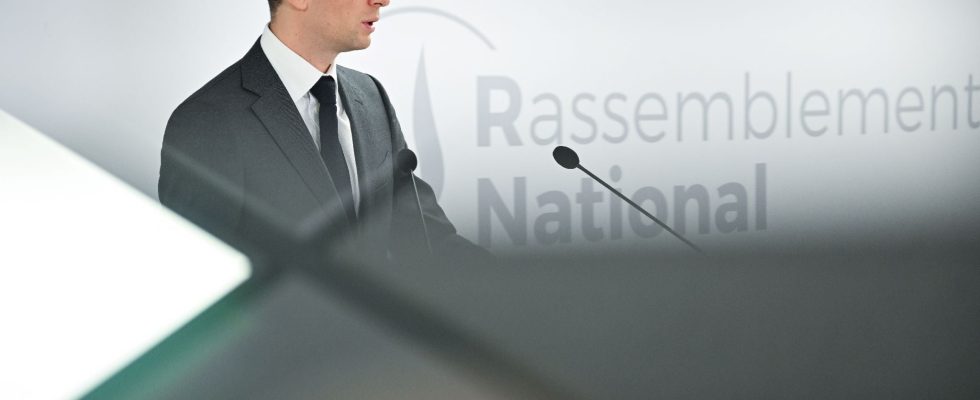The privatization of France Télévisions and Radio France? “A margin of maneuver [budgétaire] of 3 billion euros”, affirmed Sébastien Chenu, spokesperson for the RN, the day after the European elections. The stock market shares of private channels are plummeting… “An objective”, backpedals a few days later Jordan Bardella, president of the extreme party right And then a once again “topical” measure, repeats the boss of the RN. Delays which, for Martine Lombard, reflect the unpreparedness of the party in the face of an extremely complex project, and dangerous for media pluralism.
L’Express: Jordan Bardella spoke of the privatization of public broadcasting as an “objective” even though it appeared in the RN program in 2022. If this is a backpedal, what does that mean? he ?
Martine Lombard: In my opinion, it is more an awareness of the difficulties of the operation than a backpedaling. The National Rally teams had to grasp the enormity of the obstacles to overcome to privatize France Télévisions and Radio France. The measure did appear in Marine Le Pen’s presidential program in 2022, but apparently without a precise study of its technical and legal feasibility.
What room for maneuver does a new government have to carry out this privatization?
Their capital is held directly by the State, their privatization would therefore only be possible by the adoption of a very complex law, to try to remove three barriers. The first is technical: thanks to the law relating to freedom of communication of 1986, France Télévisions and Radio France have priority in allocating frequencies, without time limit, for the exercise of their public service missions. The channels would therefore be exposed to losing their broadcast frequencies in the event of privatization. I am not sure that the RN understood that it was preparing to sell empty shells once privatized. Unless the law in force is modified… if the Constitution allows it.
This is the second obstacle, which raises two questions. Does public broadcasting manage a “constitutional public service”, which the law could not then suppress? Jurisprudence has never yet said what this notion positively covers; this could be the opportunity. Even if this is not the case, will the law really remove their “national public service” character? However, this must be a prerequisite for any privatization according to wise people. To date, they have never obstructed privatization, but the cases of GDF or Aéroport de Paris were simpler. This time it would be a moment of truth for the Constitutional Council.
The final obstacle paradoxically lies in the very good audiences of Radio France and France Télévision which, respectively, exceed 20% and 30% share – beyond the maximum ceilings set by law. Given the strong reservations of the Competition Authority on the merger of TF1 and M6, I cannot imagine that a large block concentrating such audience shares would be allocated to a private operator. It would then be necessary to dismantle these two companies and carry out a piecemeal sale.
If the RN managed to overcome these obstacles, what room for maneuver would Emmanuel Macron have to prevent this project from succeeding?
He would have few resources. Unless Jordan Bardella, a possible tenant of Matignon, made the mistake of wanting to privatize by ordinance – the Head of State could refuse to sign them. But if the law is adopted by parliamentarians, Emmanuel Macron could only, as 60 parliamentarians could do, seize the Constitutional Council before its promulgation, to sanction the provisions which appear to him to be contrary to the Constitution. Its real power would be that of speech, to alert the French of the danger of such a law…
Can the RN fear the financial markets? This is evidenced by the fall in M6 and TF1 shares on the stock market after the European elections…
If Bardella seems reserved, the financial markets have already taken this announcement seriously. And interpreted it as a future loosening of advertising constraints for France Télévisions and Radio France, which must maintain time slots without advertising to this day. This prospect may annoy some owners of private channels and may not be very appropriate during an election period.
The measure officially concerns the purchasing power of the French. But what would be the consequences for media pluralism?
The RN assures that the privatization of public broadcasting would save 3 billion euros in annual funding. The sale of these public channels would above all be a major double opportunity. To increase the influence of Vincent Bolloré – who should give up channels because he has already reached the legal ceiling on DTT. And as a much more radical political weapon than what is currently being done in Italy vis-à-vis the RAI: Giorgia Meloni limits herself to making appointments there where the RN’s solution would be to eliminate them purely and simply. We must not be fooled: beyond the economic argument, this would make it possible to permanently silence critical public channels.
.
